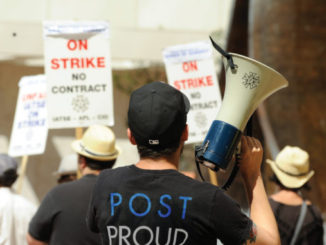
by Louis Bertini, MPSE

A feature editor I know once hired an assistant who had a problem with punctuality. Each morning, he would show up to work a little bit later than the day before. The editor, who always came in early, told the assistant that he wanted him there at 9:00 a.m. The assistant blamed his problem on a faulty alarm clock, and promised to be on time from then on. But as the days passed, 9:15…9:20…9:30… He continued to come in late. The editor gave him an ultimatum: “Be here on time from now on or that’s it!” The assistant was mortified. He swore it would never happen again. And the next day he showed up at 10:00. He was immediately fired.
This may be an extreme example of what not to do in the editing room––and the assistant in this case had only himself to blame for losing his job. But it does speak to the fact that freelance workers, which make up the vast majority of our membership, walk a fine line between employment and unemployment. And surviving as a freelancer, especially in today’s tough job market, requires you to constantly be on top of your game.
Sometimes, even when you try your hardest, circumstances and personalities can work against you. Another friend of mine once worked as a sound editor on a feature that was a troubled project, for various reasons. It was a large sound crew, and there was turmoil in the editing rooms, with sound editors and assistants being hired and laid off throughout the job. The supervising sound editor had control over who stayed on and who left, and the crew was kept on edge wondering who would be the next to go.
One morning, my friend woke up feeling very sick. He tried to fight it off, and trudged in to work. He sat down at his workstation, could barely lift a finger, and realized that he wasn’t going to be able to do any work. He couldn’t find the supervisor, and left him a message that he had to leave because he was sick, but was certain he would be better the next day. When he got home there was a voicemail waiting for him: “Sorry to hear you’re not feeling well. Of course you needed to go home and get some rest. And by the way, you don’t have to come in tomorrow either!”
Freelancing is certainly not for everyone. Most people always want to know where the money is coming from to pay the next month’s bills. They can’t deal with the uncertainty that this kind of life will bring. On the other hand, some people thrive on it and wouldn’t live their lives any other way. They hate the thought of always being tied to one office, and want the variety of moving from job to job.
Sometimes, even when you try your hardest, circumstances and personalities can work against you.
Others have more than one career. They may work as editors for part of the year, and as writers or musicians for the rest. Still others prefer to move around the country––or the world––and can stay put editing in New York or LA for only so long.
In a previous era on the East Coast, the television networks all had staff editing departments. Local 771, the East Coast editors union at that time, had a contract that covered film work only. Video work was covered by NABET and IBEW. When film began to be phased out of the networks, the 771 shops were closed down.
The announcement in 1992 that ABC TV was closing down its last film department caused a major uproar. I remember this well because, at the time, I had just become a union board member, and it was one of the first problems I had to deal with. The staff members were in a panic because they were losing long-held jobs and had no idea of where to turn to for work. Basically, their careers were over.
But there were also a few freelancers in the department. For them, it was par for the course. They knew how to go from job to job, and were able to move on. It was a great example to me of the resiliency of successful freelancers.
So we continue to slog our way through this Darwinian lifestyle––where only those who are best at it can survive––and hope that we will always quickly find that next job. But there are at least a couple of things of which freelancers can always be certain: We can never plan a vacation too far in advance, because we will always be forced to work during that time if we do; and we will invariably be unemployed for six months and then offered five different jobs that all start on the same day.





